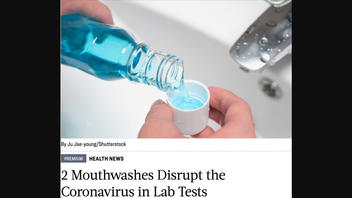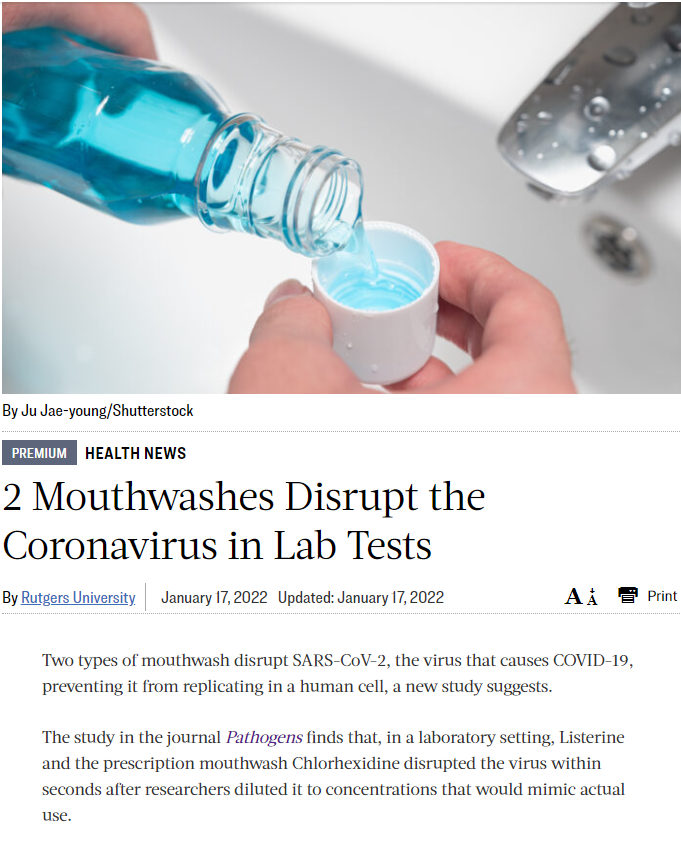
Do some mouthwashes "disrupt" COVID-19 in the lab? Yes, that's true in a lab, but it's not a field-tested cure and researchers say it needs more study. The report by Rutgers University scientists, published March 1, 2021, shows two types of mouthwash "reduce virus infectivity" in the laboratory -- Listerine and the prescription Chlorhexidine (CHG). Neither the World Health Organization (WHO) nor the makers of Listerine recommend relying on gargling to prevent or treat COVID. The lead author of the study told Lead Stories that the research is a year old and there's no interest in continuing it. That researcher also questioned why an online publication would seemingly try to portray a year-old study as current news.
The claim appeared in an article (archived here) published by The Epoch Times on January 17, 2022, under the title "2 Mouthwashes Disrupt the Coronavirus in Lab Tests." It opened:
Two types of mouthwash disrupt SARS-CoV-2, the virus that causes COVID-19, preventing it from replicating in a human cell, a new study suggests.
The study in the journal Pathogens finds that, in a laboratory setting, Listerine and the prescription mouthwash Chlorhexidine disrupted the virus within seconds after researchers diluted it to concentrations that would mimic actual use.
This is what the post from The Epoch Times looked like on January 19, 2022:

(Source: The Epoch Times screenshot taken on Wed Jan 19 16:08:44 2022 UTC)
The Epoch Times article is a reprint of a news release by Rutgers University originally published on March 16, 2021, about a Rutgers study published in the journal Pathogens on March 1, 2021, long before the delta and omicron variants became widespread. The study came to these conclusions:
Our results indicate that mouth rinses can significantly reduce virus infectivity, suggesting a potential benefit for reducing SARS-CoV-2 spread. ...
Since diluted Listerine and CHG exhibited no cytotoxic effects [causing damage to living tissues], these products may be good candidates to reduce virus spread. Studies of the antiviral effects of mouth rinses are needed for determining their clinical efficacy in reducing virus spread, particularly in asymptomatic individuals.
In a January 20, 2022, phone interview with Lead Stories, Dr. Daniel Fine, the paper's senior author and chair of the Department of Oral Biology at Rutgers, said he's surprised The Epoch Times is trying to pass off an old study as news:
We really don't have any additional information. ... I don't understand how they could be quoting a paper that's a year old.
The Epoch Times report, dated January 17, 2022, gives no indication that the study is a year old and predates the advent of two major coronavirus variants.
This particular study was looking at the use of mouthwash as a way to potentially protect dental providers from viral matter exhaled by patients, not the public in general, the news release says. Co-author Eileen Hoskin is an assistant professor at Rutgers School of Dental Medicine:
'As dentists, we're right there in a patient's face. We wanted to know if there's something that might lower the viral load.'
In his phone interview with Lead Stories, Fine said there wasn't enough data from the study to make any recommendations on using the two types of mouthwash to prevent the spread of COVID:
Whatever is done ... may have an effect on the virus immediately, but is it suppressive enough? ... and that's not known. ... You can't focus on the mouth; you have the nose and the rest of the body.
He said he's found there to be no interest in additional studies on mouthwash and the spread of COVID. In the 2021 press release, he cautioned the public against relying on mouthwash as a way to slow the spread of the virus:
'The ultimate goal would be to determine whether rinsing two or three times a day with an antiseptic agent with active anti-viral activity would have the potential to reduce the ability to transmit the disease. But this needs to be investigated in a real-world situation. ...
'Since the SARS-CoV-2 virus responsible for COVID-19 enters primarily through the oral and nasal cavity, oral biologists should be included in these studies because they have an in-depth understanding of oral infectious diseases.'
Several other studies (here, here and here) point to the potential benefits of various types of mouthwash in slowing the spread of COVID, although none of them claim to be a cure for the virus.
The WHO takes it a step further, saying there is no evidence mouthwash protects against COVID infection:
🇶: Can gargling mouthwash protect you from infection with the new coronavirus (2019-nCoV)?
-- World Health Organization (WHO) Western Pacific (@WHOWPRO) February 4, 2020
🇦: There is no evidence that using mouthwash will protect you from infection with the new coronavirus (2019-nCoV).
➡️https://t.co/ZfWNlgyWsv pic.twitter.com/cYRfmUpo45
Johnson & Johnson, the makers of Listerine, also distance themselves from the notion and say this on their website, LISTERINE USAGE GUIDELINES AND COVID-19:
LISTERINE® Antiseptic is an antimicrobial mouthwash that is clinically proven to kill germs that cause plaque, bad breath and the early gum disease, gingivitis. LISTERINE® Antiseptic is not intended to prevent or treat COVID-19 and should be used only as directed on the product label.
Although there are recent lab-based reports (in vitro studies) of some LISTERINE® Mouthwashes having activity against enveloped viruses, including coronavirus, the available data is insufficient, and no evidence-based clinical conclusions can be drawn with regards to the anti-viral efficacy of LISTERINE® Antiseptic mouthwash at this time.
Our understanding of the course of COVID-19 disease transmission continues to evolve. More research is needed to understand whether the use of mouthwashes can impact viral transmission, exposure, viral entry, viral load and ultimately affect meaningful clinical outcomes.
An earlier Lead Stories Fact Check also looked into mouthwash and COVID-19.

















